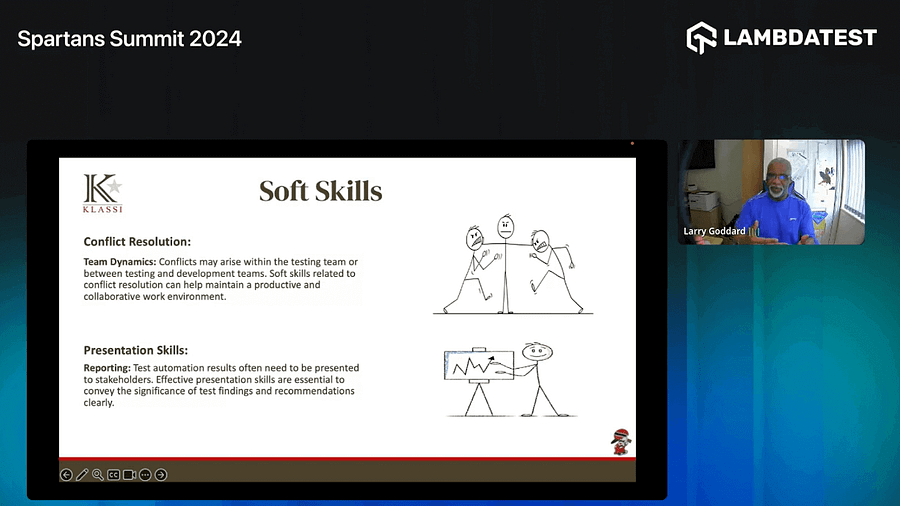The Importance of Soft Skills in Test Automation [Spartans Summit 2024]
 LambdaTest
LambdaTest
In test automation, having soft skills is just as crucial as technical expertise. These interpersonal abilities empower testers to collaborate seamlessly, adapt to evolving situations, critically analyze them, and contribute meaningful perspectives.
As test automation advances, soft skills become important in ensuring the smooth and impactful execution of testing initiatives.
In this insightful session of Spartans Summit 2024, Larry Goddard, Test Automation Architect at Oxford University Press, talks about the importance of soft skills in test automation.
Couldn’t catch all the sessions live? Don’t worry! You can access all the recordings easily by visiting the LambdaTest YouTube Channel.
Communication Skills
Larry emphasizes the importance of communication skills in the context of test automation. According to him, effective communication is a cornerstone, enabling testers to engage seamlessly with developers, product managers, and other team members. Whether through spoken words or written documentation, communication plays a key role in defining test cases, reporting bugs, and discussing testing results.
In Larry’s view, team collaboration is a pivotal aspect where relationships are built, ideas are shared, and a positive working atmosphere is fostered. As he highlights, this collaborative environment facilitates discussions on test cases, bugs, and results.
Furthermore, Larry underscores the role of documentation as a form of communication. Clear and concise documentation is cited as a critical skill, ensuring everyone involved in the testing process is on the same page.
He encourages testers to develop strong communication skills through verbal interaction or written expression, as they play a central role in the testing workflow.
Problem Solving and Critical Thinking
Larry places significant emphasis on problem-solving and critical thinking as essential skills in test automation. He draws parallels between these skills and the ability to solve everyday problems, ranging from resolving conflicts among developers and testers to debugging issues in test automation.
According to Larry, critical thinking helps identify potential issues and design test scenarios that cover a broad range, including edge cases. This skill is crucial for testers to foresee and address challenges that may not be immediately apparent in standard scenarios.
When it comes to problem-solving, Larry suggests that, as testers, it is about finding issues and proactively coming up with viable solutions. In his opinion, this proactive approach to problem-solving enhances the tester’s role and contribution to the overall testing process.
Larry highlights how problem-solving and critical thinking are integral to effective test automation. These skills empower testers to navigate complexities, foresee potential challenges, and contribute to the continuous improvement of the testing process.
Attention to Detail
Larry emphasizes the importance of attention to detail as a crucial soft skill in the context of test automation. He draws parallels between everyday practices of paying attention to our surroundings, such as crossing the road or observing people on a bus, and this very same approach is required in test automation as well.
Attention to detail is the systematic creation of test cases in test automation. He stresses the significance of ensuring these test cases are comprehensive and cover all necessary scenarios. Even a minor oversight can lead to incomplete tests and potential inefficiencies in the testing process.
By highlighting attention to detail, Larry underscores its role in preventing oversights, ensuring thorough testing coverage, and contributing to the overall effectiveness of test automation. According to Larry, this soft skill plays a critical role in creating robust and reliable testing procedures.
Empathy
Larry touches upon the significance of empathy as a soft skill in test automation. He describes empathy as the ability to understand and consider different perspectives, explicitly emphasizing its relevance in the testing process.
In Larry’s view, empathy allows testers to work with various viewpoints, including those of the end users. By empathizing with user needs and experiences, testers gain valuable insights that contribute to writing effective test cases. This alignment with user perspectives ensures the testing process is technically robust and user-centric.
The role of empathy extends to understanding how users interact with the product. This understanding informs the creation of test cases that align with the user experience, resulting in more relevant and impactful testing.
Larry sees empathy as an essential soft skill that enhances the tester’s ability to create test cases that resonate with the end users, ultimately improving the product’s overall quality.
Conflict Resolution
Larry mentions the significance of conflict resolution in test automation, citing instances ranging from childhood conflicts over toys to more professional disagreements between testers and developers.
He stresses the need for a peacemaker, especially in scenarios where a tester asserts the existence of a bug and the developer denies it. The resolution process involves bringing the conflicting parties together, fostering a collaborative working environment, and ultimately contributing to the project’s success. Effective conflict resolution is pivotal in shaping team dynamics, enabling a more comfortable interaction between testers and developers and leading to product improvement.
Furthermore, Larry links conflict resolution to effective communication and says that a transparent exchange of ideas is essential for resolving disputes within the team. The ability to find common ground emerges as a critical element in this process, requiring testers and developers to collaborate on issue resolution and work together to enhance the overall product quality.
Presentation Skills
Larry discusses the importance of presentation skills in test automation. He acknowledges that while many individuals possess this skill, there is often a sense of intimidation when it comes to putting it into practice, particularly in the QA automation world. He draws attention to the specific relevance of presentation skills in reporting, especially when dealing with stakeholders who often prefer graphical representations and clear communication of test findings.
He explains that effective presentation skills allow test automation professionals to convey the significance of their findings and recommendations to stakeholders in a clear and compelling manner.

Whether delivering reports during a scrum meeting or presenting to the product manager, these skills are crucial in ensuring that the information is communicated effectively and that all stakeholders understand its importance.
Adaptability
Larry highlights the significance of adaptability between personal adaptability in everyday life and its importance in test automation. He uses an example of adapting to a physical injury, illustrating the need to learn how to navigate daily tasks with crutches, relating it to the adaptability required in an Agile development environment where requirements frequently change.
He explains that adaptability is crucial when dealing with changing requirements. He discusses the challenge of modifying test scripts quickly in response to evolving project needs. Further, he mentions how adapting to such changes, even mid-way through writing a test case, is a valuable skill. He encourages the ability to make necessary adjustments to test scripts without discarding the entire work, showcasing how adaptability contributes to efficient and effective test automation best practices.
Time Management
Larry then talks about time management, drawing a comparison to personal experiences, such as the challenge of waiting for someone to finish applying makeup before leaving for an event. He connects this to the broader concept of how individuals manage their time in various aspects of life.
He highlights the importance of time management skills and prioritization, mainly when dealing with multiple test cases. He emphasizes the need to determine what to automate first, what to put on hold temporarily, and how to manage time efficiently when working within time constraints. Larry suggests that effective time management in test automation involves careful prioritization of test cases based on their impact and importance, contributing to a more streamlined and productive testing process.
Leadership and Mentoring
Larry explores leadership and mentoring skills within test automation. He views mentoring as a crucial aspect of leadership, highlighting the responsibility of leaders to ensure that the expertise of their team members is continually elevated. He then stresses the importance of two-way communication in mentoring, where the mentor and mentee benefit from exchanging knowledge and perspectives.
From a leadership standpoint, Larry emphasizes that a good leader is not only someone who leads but also someone who can follow. He believes that effective leadership involves understanding and valuing the ideas and insights of team members. The ability to lead and follow creates a dynamic learning culture within the team, fostering continuous skills development. Larry views leadership and mentoring as essential components that contribute to finding new and improved ways of approaching challenges and driving success within the team.
Q&A Time!
Q: What soft skills do you believe are most crucial for test automation professionals?
Larry: Well, communication tops the list for me. Despite having strong leadership and other skills, effective communication is the linchpin. If you can’t convey your ideas to your team and other project stakeholders, all those skills won’t carry much weight. So, communication is where I’d start and then weave in the rest.
Q: Do you recommend any exercises to help improve critical thinking skills?
Larry: Great question! Personally, I don’t have specific exercises, but what works for me is creating scenarios. Craft an environment that demands critical thinking, forcing you to put on your thinking hat. Start simple, then make it more intricate. The key is having the team think outside the box finding innovative solutions to complex problems.
Q: There is a line between employing soft skills and escalating concerns. What are your thoughts on this?
Larry: I don’t see a clear line, but it’s about how you handle it. Soft skills come into play by reporting a bug and offering a solution. It extends to collaborating with developers. Break the stereotype of testers and developers being on opposite sides. Direct communication with developers removes unnecessary barriers for a smoother workflow.
Got more questions? Drop them on the LambdaTest Community.
Subscribe to my newsletter
Read articles from LambdaTest directly inside your inbox. Subscribe to the newsletter, and don't miss out.
Written by

LambdaTest
LambdaTest
LambdaTest is a continuous quality testing cloud platform that helps developers and testers ship code faster.